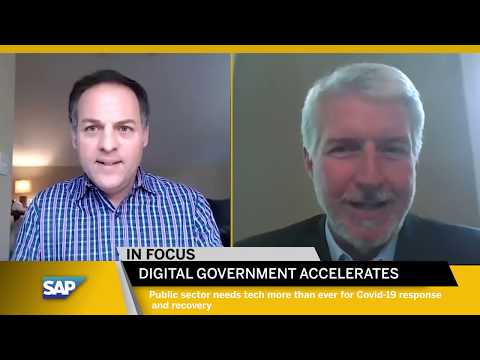Government organizations globally have scrambled to continue servicing citizens while helping employees switch to working at home effectively and securely in the wake of the COVID-19.
Before the introduction of shelter-in-place and social distancing policies, many government agencies were not equipped to support employees in working at home. For others, working at home was simply not an option.
According to Brian Roach, head of Regulated Industries at SAP, this highlights the “haves and have-nots” in government agencies. The “haves” had already invested in digital technologies and mobile capabilities. The “have-nots” were often paper-driven and spent the day working on desktop computers.

Factors like budget, work culture, and agency objectives influence the divergent maturity levels for digital government initiatives. For example, wealthier cities like San Diego have surged ahead in technology adoption, whereas agencies that depend on in-person signatures or notarized documents may still be analog.
Regardless, the pandemic has underscored the need for government agencies to raise their digital game. As digital government becomes a bigger priority, Roach identifies three trends he believes will accelerate as governments and their agencies tackle issues linked to the pandemic — and prepare for health crises in the future.
Data-Driven Government
Roach believes that the pandemic will speed up governments’ investment and use of data analytic technologies. “The government needs the ability to mine data, learn from it, and turn it into actionable items – that will improve government in general,” he said.
Organizations can use data to monitor public health, simulate financial models, and to conduct what-if analysis for pandemics. These insights inform smarter policy, programmatic decisions, and the ability to manage risk.
When crises hit, public agencies that act based on accurate information are best positioned to weather emergencies.
“We’re seeing hospital systems that were prepared with predictive technology doing extraordinarily well, they’re not getting overrun,” said Roach. “Those that act as a result of what they’ve learned, and those that don’t – that will be the difference maker.”
Focus on Constituent Experience
Before the crisis, public agencies were leveraging technology to improve citizens’ experience and Roach expects this trend to accelerate.
“We’re going to see the value of citizen experiences, and agencies need to interact with citizens in a different way,” he said. “People haven’t been able to walk into a social security office to receive a check and you have to transform how you’re interacting with the citizenry.”
The Internal Revenue Service (IRS) highlights how U.S. government agencies had already started using technology for better constituent experience, before the virus outbreak. In 2019, the agency announced its multi-year IRS Modernization Plan focused on updating how the agency “interacts with taxpayers” (source: IRS).
“The IRS is interacting with citizens in a different way – digital interactions and digital transactions have been improving over the years,” Roach explained. “It’s getting to where it’s far more integrated, far more capable, far more organic to the functions of those departments, as opposed to just thin layers of filling in a static website with information.”
Uneven Path to Digital Government
According to Roach, when we speak of the government, we are actually talking about a “large and complex set of services and institutions, where technology innovation and inclination really varies: “There’s always an element of government that is leading edge, and others, whether it be for budget or regulatory reasons, that tend to lag.”
But one thing is certain: The lockdown is pushing all institutions to put a better digital strategy and a technological infrastructure in place.
“There’s no question that things will change going forward, and for the better. We will come out of this much stronger and smarter. It’s easy to be armchair quarterbacks today, but I think the difference will be in the future,” said Roach. “There’s not a silver bullet, there’s not a button that you press and suddenly, you’re digitized, data-driven, and citizen centric. But it’s a journey and we will all get on it together.”
Listen to the full interview with Brian Roach:
Listen to the full interview on
Apple Podcasts, Google Podcasts, RadioPublic, or Spotify.
